SPECIALTY COFFEE AND THE RISE OF WOMEN COFFEE ROASTERS

The roasters of some exceptional coffees are women. Does it matter?
When we evaluate coffee, its quality, taste and flavor, we tend to create a situation of impartial sensory evaluation. We try not to know where the coffee was grown, roasted, or other factors that may influence whether or not we like them, such as how the beans lock or which means of packaging is used, since all these factors may influence our opinion about the tasting and potentially bias us in one way or another..
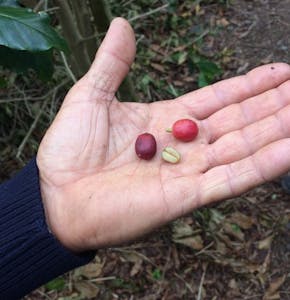
Coffee beans in different maturation states during our Food & Wine Trips to Azores, visiting a local producer | Photo: Sílvia Olivença
But once we choose the coffees we want to bring you, and when all the ratings and sensory descriptions have been made, we do want to know all the details about each coffee!
With every decision we make, when bringing products to you, we care about their quality and origin but our work is also to honor people, places, cultures, and histories. We integrate personal narratives into our offerings in an effort to help our clients feel more connected to the product and the producer.
In this case, it matters to the roaster in particular, who made a significant contribution to the end product, as they can make a big difference in the taste and flavor of the coffee.
If this roaster is a woman, our voices will be even louder, since this is still a role that is traditionally filled by men, in a historically male-dominated field.
But first of all, why is roasting so important in the process of making coffee?
Coffee flavor explosion
The world of coffee is a delicate balance between many factors: where the beans are grown, how they’re processed and dried before roasting, and even what kind of roast profile you choose.
Coffee beans are seeds that have been maturing in the coffee cherry. They then undergo processing and drying to become green coffee beans as the one you can see in the picture, taken in the Azores during a visit to a local producer during our Food and Wine trips. When they start out, these little guys don’t smell like much at all – rather more beany with a grassy aroma than anything else!
But before roasting begins, we’ve got many different compounds waiting for their chance to shine… The aroma of coffee as you know it, as a consumer, is made up of over 1000 different compounds, created by the roasting process and the roaster decisions.
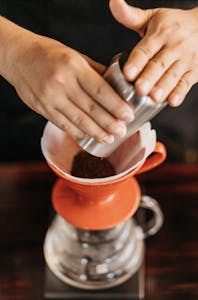
Brewing coffee at home. Some of the most popular methods include french press, pour-over, chemex, and aeropress.
The moment you roast those coffees into something darker (and give them time), there’s an explosion of flavors and smells ready: overtones poignant as chocolate or caramelized sugar; notes sharp as black pepper or tart citrus zest; accords rounder and richer than syrup on pancakes rich in molasses spices and butterscotch richness….
These aromatic chemicals are what give each type and blend its distinct flavor – for example, high-grown Arabica beans will have a more floral scent than low-grade Robusta bean blends as they roast at higher temperatures.
During this process the roaster, adjusts all the relevant parameters in the roaster machine, to adapt them to the bean characteristics but also to atmospheric conditions like humidity and temperature, along the roasting process. By doing so, s/he creates the best profile for a specific coffee and imprints its own professional personality through his/her decisions.
Because of the human touch, each roasting process can be unique!
She’s the roaster
In 2016, Jennifer Apodaca, a woman who was on the events committee for U.S Roasters Guild, spearheaded an online movement called #shestheroaster to emphasize the gender gap in coffee and encourage diversity by inspiring women like her to enter roaster competitions, in an industry where men have traditionally dominated for centuries. In fact, from the 40 competitors who entered the U.S. Roaster Championships that year, she was the only woman.
Since then, more than 14 thousand Instagram posts later, images of women roasters have flooded the Internet (along with transgender, non-binary, and gender non-conforming).
Apodaca was inspired by these photos to form She’s The Roaster – a nonprofit organization that helps fund scholarships for women in coffee education programs.
Women improve quality
In recent times the number of female baristas has increased dramatically as social media platforms such as Facebook or Twitter are being used for spreading awareness about this profession among young people around the world.
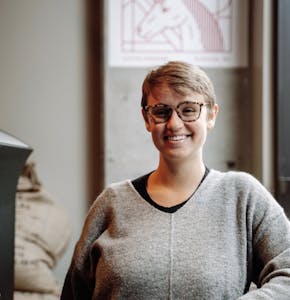
Gabi | Photo: Caballo Rojo
In 2017, Craig Holt founder of Atlas Imports (a USA-based specialty coffee importing company) stated on a panel about women in coffee that, wherever women appear in the supply chain, quality is improved.
For all these reasons, yes, it matters if a roaster is a woman! Let’s meet a few ones, namely one of our partners, Brava in Lisbon!
Women-owned coffee around the world
Caballo Rojo in Durham
Caballo Rojo endorses Gabi’s grandfather’s roasting legacy, who started his own roasting company in Venezuela, which then grew into a coffee empire. He pioneered a company that provided for his six children. He invested in the community and employed others to help make his dreams come true while bringing people together with good values like giving back, hard work and excellence.
Gabi’s love for coffee started via her mother’s – on Saturday mornings she was getting a “café con leche” in a small espresso cup – and grew when she learned about the people behind the process of farm to cup.
In college she was inspired to merge her background in business school, global studies and direct trade with her passion for Latin American culture and coffee, and she started Caballo Rojo Coffee, honouring her grandfather’s Latin American heritage and work.
The coffee roasting process is one of the many ways that Gabi participates in the positive development and growth of a rural community. Direct trade with farmers, consumer education, and appropriate development are all part of her involvement.
Caballo Rojo is deeply rooted in Gabi’s Latin American heritage and noble values pass down through generations, and we can taste it!
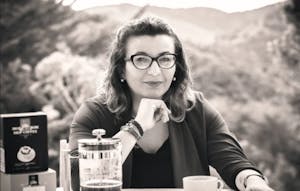
Mrs. Sevilla from Café Los Santos | Photo credits: Café Los Santos
Café Los Santos in Tarrazú
SB Café Los Santos Tarrazú is a women-owned coffee farmer family business, focused on an inclusive business model and direct trade of roasted coffee. They are committed to the coffee growing communities to get a fair price for the crops, with particular emphasis with the women of the local communities.
From an early age, she had her first contact with coffee when she and her family were collectors in the mountains of Tres Ríos and San Pedro.
Mrs. Sevilla has always shown a strong character that is driven by an insatiable thirst for knowledge and experience in all things she sets out to do. Her early profession was as an interior designer before pursuing other independent entrepreneurial endeavors. She is currently a taster, barista, and on top of it, studies in marketing and web development.
In her own words “I go as far as my mind allows me, I do not limit myself, and I am full of potential doing the right thing for my business, but the most important thing is my family and community.”
Costa Rica is home to eight coffee growing regions, the most famous of which are Tarrazú — known worldwide for its exceptional quality beans and breathtaking views and mountain trails. The Tarrazú region itself can be found in the interior mountains; so if you want to enjoy your cup while admiring a gorgeous view then this one’s for you!
Brewpoint coffee in Miami
The journey of this coffee roaster began with Melissa, leaving her corporate life to do community work in the Philippines.
As soon as she got home, the first thing that Melissa did was to search Craigslist for an espresso machine. In just three years’ time, we saw her open up a coffee shop on Main Street in Downtown Miami with her husband Angelo!
Though they both work in the business, Melissa is the visionary and leader of the company, representing women and minorities. She’s taking charge on their platforms by leading them to success.
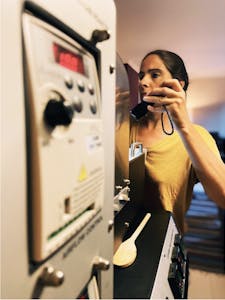
Joana from Brava coffee roasters, based in Lisbon | Photo credits: Brava
Brava Roasters in Lisbon
We’ve landed in Lisbon, now!
Brava was founded by two women, Joana and Susana, who traveled the world following a passion: to learn how to select, roast and grind the best coffee, and exists since 2018.
They passionately follow the whole life cycle of the coffee, from crop until it lands in our cup. Sustainability and ethics are a big deal to them. They researched who are the sustainable and ethical farmers that resonate with their beliefs, so they could select and roast some of the best, ethically produced coffee worldwide for us.
Joana and Susana believe that the soul of specialty coffee is to keep the identity of each coffee alive, regardless of the method of extraction – Espresso, Chemex, Aeropress – and for this reason, Brava is also a micro-roaster. The same care applied when choosing the grain continues in the roasting, made in small batches.
Their roasting profiles are rigorously designed in order to highlight all the individual flavors of each coffee, raising the characteristics of each bean to its peak to provide us with an explosion of aromas that transform the act of drinking a coffee into tasting time.
Joana and Susana have several passions and because of this, they own one of the most popular clubs in Lisbon, named Purex Club, in the Bairro Alto district. This LGBTQIA+ friendly club, hosts several DJs and the musical program favors the latest electronic trends as well as revivalist hits.
Joana, what are your first memories related to coffee?
My oldest memories with coffee… On the farm where I lived with my family, the lady who worked with us, when I woke up, she always had a big coffee bowl with soaked pieces of breath inside. I believe it was not 100% coffee… probably more like coffee mixed with cereals, but the smell was amazing! And I was also so curious to try it, but she always said that I was too young to drink it!
I think is interesting how so many people who are in love and live for food or beverages, like coffee, refer to the interdictions lanced by their parents or a close adult, as strong formative memories to chose this path. I am recalling, for example, a similar description by Anthony Bourdain, when he was maybe… 9-11 years old. His parents left him in the car with his brother while they were having dinner in a restaurant that it was, he later came to know, the “(…) Mecca of foodies”. (“Kitchen Confidential”). He associates this experience with something secret, important, related to food, that instigated in him a constant quest.
Another old memory is with my grandmother… when we went to her place, on weekends or whatever… when she was doing the Moka. She made her coffee with a Moka pot. I found that fascinating, the way she opened the lid to see if the coffee was ready, the good smell coming from there. Knowing what I know now, about coffee and Mokas, I know she drank burned coffee…
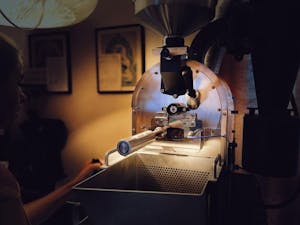
Brava roaster machine | Photo: Brava
… farewell to romantic narratives! (laughs)
…but anyway, all the ritual, the smell, all that fascinated me.
How did you become a coffee roaster?
During university, I lived in London, near Camden Town. There was a man who did wood-roasted coffee. It was not only intriguing to see this man around the roast machine but also the way he used the crank to fan the flames. He had coffees from different countries and different techniques to roast the beans… all that piqued my curiosity even more. I started to buy different coffees, discovering that different coffees had different tastes.
In London, specialty coffee was already something very important. Well, not only specialty coffee… basically there was, and there is, a huge diversity of coffees. And I always loved the coffee culture, so I was constantly looking to taste different coffees, knowing about the origin. Basically, I was trying to absorb all the possibilities London offered, which were, back then, inexistent in Lisbon
When I came back to Portugal and started to travel around the world and coffee was what guided my travel destinations. What type of coffee they have, what are their characteristics, what is the extraction method they use the most, if they have specialty coffee. Those were my questions.
Going back to London, one day, I found myself staring in front of a strange machine that I found amazingly beautiful, in a coffee shop, the Ozone Coffee Roasters. But I didn’t know what the machine was. Talking with the lady at the coffee shop, she revealed it was a roast machine! This made me think ‘I should probably learn and get into roasting’.
Like an epiphany…a moment, in this case, an object, that connects all the past episodes related with coffee!
So, I started to search for courses and training. I was then trained by the Speciality Coffee Association. In Portugal, we have a really good teacher Sandra Azevedo, from Academia do Café, who is my mentor. I was also trained in Holland and I did several online courses. I always try to go to Global Coffee events and Roaster Camps.
Another place that impacted me a lot was Australia. They are crazy about coffee and the coffee culture is so strong. But not only for the coffee as a drink but also as space, which transforms the way you drink and experience the coffee, in fact.
Which are your favorite beans?
My favorite coffee is geisha. It’s just an explosion of flavors. It’s not an easy coffee to find, although. Apart from geisha I normally prefer more acidic coffees, either from Quenia or the Ethiopian ones.
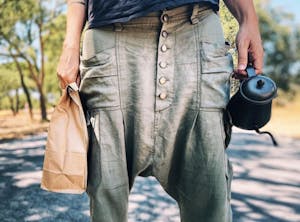
Susana on the road | Photo: Brava
Which roaster machine do you use?
At the moment it’s an FC 94 Coffee Tech. It’s an electric roaster. I think the main reason why I’ve chosen it is that this was the machine where I learned how to roast it during my training course. Then the second import factor is that it’s a manual roaster machine, which means that I can adjust all the relevant parameters to adapt them to the bean characteristics – the bean density e.g. – but also to atmospheric conditions like humidity and temperature, along the roasting process. By doing so, I create the best profile for that specific coffee.
This is like a metaphor, to me. It’s how you should think about everything or everyone. Look for potentialities and enhance them, allowing them to expand and exist. Reveal them. Roasting, as you describe, looks like it is all about that. Anyway, what do you think distinguishes you as a roaster?
The passion we have for coffee. The care we have along with all the processes. From the moment we choose our coffee beans, the certification, but also by ensuring that we are having a positive impact in the country of origin. Then the fact we roast only in small batches, to guarantee its freshness. For each coffee, our aim, with roasting, is to extract the best profile for that coffee. Finally, we only use compostable packaging.
Any of your coffee comes from direct trade?
Yes, the one from Brazil, with the producer Filipe Orioli.
What type of coffee beans do you use?
At Brava, we only use Arabica coffee beans.
Why?
Well, as you may have heard, the two most commercialized coffee species are Arabica (an oval, delicate and rich bean) and Robusta (a rounder bean, with a bitter taste due to its high caffeine content). At Brava we only roast and process Arabica coffee, as it is known to be of better quality – capable of producing intense and intricate flavor with floral, fruity, honey, or even chocolate aromas. Arabica produces less coffee per hectare than robusta, greatly increasing the cost of its cultivation. But it’s worth it – our goal is to achieve the perfect cup of coffee after all!
We know that your dedication to excellence in the coffee domain starts with sustainability namely by working with sustainable partner farms. As you mentioned before that one of your commitments is to have a positive impact on the country of origin. Why is this important to you?
The mass cultivation of coffee has been devastating to the environment and those who work in its production.
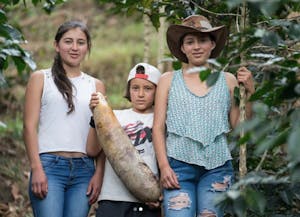
Photo credits: Asociación de Mujeres Productoras Agropecuarias del Cauca
The conscious cultivation of coffee, with a culture of environmental preservation and fair pay treats our palate with a drink of much better
quality, contributing to maintain and nurture communities and cultivation systems that are more intelligent and committed to reducing our ecological footprint within a market of ever-growing demand.
For example, one of our coffees, AMACA – for Associación de Mujeres Productoras Agropecuarias del Cauca – is a group of 140 women in Cauca, Colombia. All of these women own the land they farm and, like us, are the heads of their households. The average farm size is one hectare per member, with many even smaller – like our small batches. It all comes full circle when you do what your heart tells you to.
The coffee industry is in fact the third-largest in export revenue by country and employs 25 million people worldwide. I remember reading that 63% of those are smallholder farmers which makes us think, how urgent would be a paradigm shift like the one you practice? In this same subject, your coffee is certified by Rainforest Alliance, right?
Yes, our coffee is organic and certified by the Rainforest Alliance. Organic farming respects and works with the cycles of nature, offering us real products that are free from potentially harmful, polluting chemicals and flavorful. The Rainforest Alliance provides environmental certification on sustainable forestry and agriculture and tourism – their certificate seal gives information to consumers about business practices, based on the good standards they set by combining the interests of companies, farmers, foresters, communities, and consumers to produce sustainable and harmonious goods and services. Brava is coffee that thinks about the future.
Well, it seems a nice way to conclude our encounter! Wishing for a long future to enjoy your lovely coffee among other delicious things! Thank you!
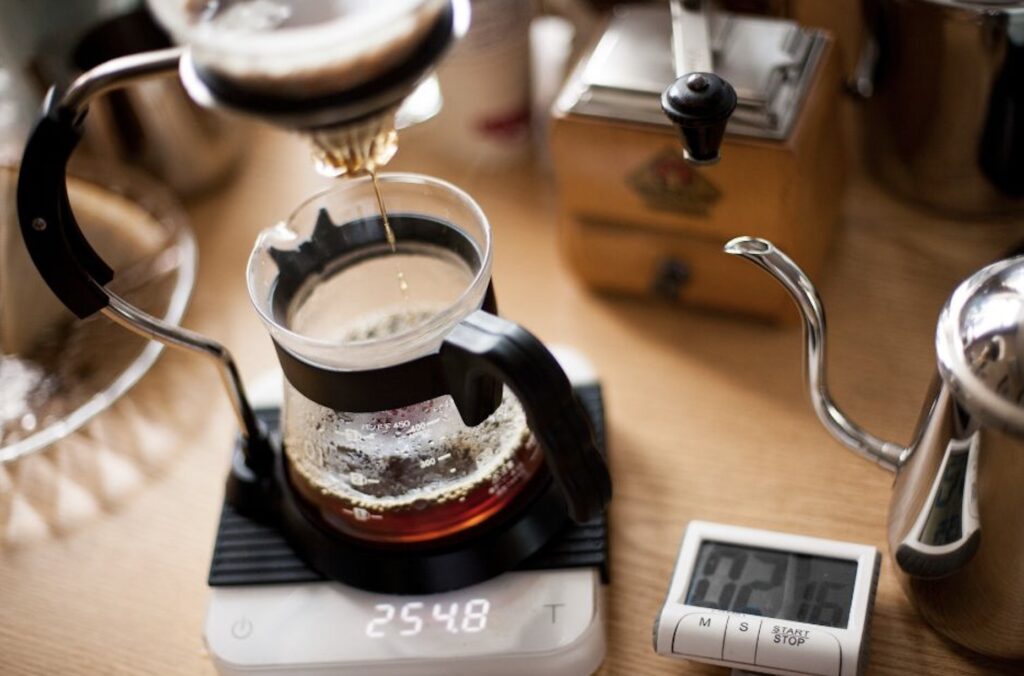
The extraction time and temperature are the two most important factors in brewing coffee. The longer you brew your beans, or the hotter they get while being brewed will result in a stronger flavor profile for that particular type of bean (or roast).
Article by :
Sílvia Olivença (anthropologist and food guide/CEO at Oh! My Cod Ethnographic Food Tours & Trips)
Want to more about Portuguese cuisine?
Pico Wine: one of the world’s most unique wine regions (Genesis – Part I)
Alentejo and Algarve: culinary traditions of the South of Portugal
African Influences on Portuguese Cuisine
